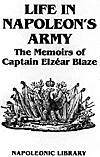 Military Life Under Napoleon: The Memoirs of Captain Elzear Blaze
Military Life Under Napoleon: The Memoirs of Captain Elzear Blaze
Author: Elzear Blaze. Translated and edited by Colonel John Elting
Pages: 216
Illustrations: 30 black and white drawings
Maps: none
Footnotes: 602
Appendices: 2
Bibliography:none
Index: none
Publisher: Emperor's Press
Publication Date: 1995
Binding: hardback
ISBN: 1-883476-06
Price: $29.50
 Life in Napoleon's Army: The Memoirs of Elzear Blaze
Life in Napoleon's Army: The Memoirs of Elzear Blaze
Author: Elzear Blaze, English Commentary by Sir Charles Napier
Pages: 198
Illustrations: 4 black and white drawings
Maps: none
Footnotes: none
Appendices: none
Bibliography: none
Index: none
Publisher: Greenhill Books (Stackpole Books in the USA)
Publication Date: 1995
Binding: hardback
ISBN: 1-85367-196-7
Price: $35.00
Summary: Written in 1837, this is a colorful memoir of the Napoleonic period. The book's primary intention is to be entertaining, and the author regales the reader with humorous stories, philosophical reflections, and sharp historical observations.
In many ways, Elzear Blaze's picaresque memoir Military Life under Napoleon, transcends the Napoleonic genre in its appeal, primarily because Blaze just happens to be a superb storyteller and a shrewd observer of human foibles. (In fact, his anecdotal style, fondness for elaborate practical jokes, and his penchant for telling "stretchers" are strongly reminiscient of American writer Mark Twain).
Thus, this is not only a book that will make you laugh aloud, it will also fill you with a appreciation of the daily existence of one of the most famous institutions in all military history. But even more importantly, Blaze's book manages to convey, as well as any, a strong sense of the spirit of the French Grand Army.
He does this through his vivid and amusing character sketches, as well as through his light philosphical meditations, which reflect his fine wit as well as the Enlightenment and Romantic influences upon his education. Blaze is a fine representative child of the Revolution, and his work reflects his era as much as it does his captivating personality.
Furthermore, if your primary purpose in reading this book is a more narrow one--to glean hard military end historical information--Military Life Under Napoleon is a treasure trove of anecdotes, as Colonel Elting, who translated the Emperor's Press edition, knew when he drew upon it in his seminal work Swords Around A Throne.
Colonel Elting writes in his introduction: "All in all, Blaze's memoirs present a clear- eyed, remarkably complete description of French Army Life, as seen by a company-grade officer with both line and staff service."
Colonel Elting is to be commended for his translation, which among other things succeeds in the task of conveying Blaze's many jokes. Also, Elting has done a wonderful job with his thorough footnotes, giving the reader a wealth of explanations and historical amplifications to glazes' numerous references that might otherwise be lost upon the modern reader.
The Greenhill Press version is a reprint of an English translation from 1850, and tends to reflect a more Victorian style of writing. Instead of Colonel Elting's footnoting, however, the first four chapters are commented on by Lt-General Charles James Napier, brother of the Peninsular Historian.
Napier, owing to the kindness he received from General Soult and Ney when taken prisoner at Corunna, is an Englishmen who is a fan of the French army, and a strong opponent of early Victorian British foreign policy. Thus, his remarks are rather interesting and represent a true historical curiosity.
In short, either version of Blaze is recommended. However, Colonel Elting's footnotes enrich the Emperor's Press version considerably. In addition, Elting's translation appears to contain more of Blaze's original manuscript, (although both books appear to have been edited down marginally, but again Elting takes pains to let us know which pages have been expurgated and why).
Take as one of the more glaring examples the chapter titled "A Day of Battle." In the Emperor's Press edition, the chapter runs 24 pages, at the end of which we learn that a long-winded anecdote, running four more pages, has been excised. In the Napier edition, although the chapter runs 27 smaller pages, the material covered ends substantially short of what the Elting version covers. It appears that Napier chose to omit one of the longer practical jokes in the book, and although it may be of little historical value, I found it very humorous.
Lastly, Elting apears to have uncovered a bit of new information on the author that Blaze himself ommitted. In the last appendice, a copy of Blaze's service record is included, showing that on 25 April 1814 he deserted from Davout's command at Hamburg! [admittedly, this was two weeks after Napoleon's abdication, but it is surprising and amusing none-the-less].
More Book Reviews
-
Military Life Under Napoleon: The Memoirs of Captain Elzear Blaze
The Waterloo Campaign
Napoleon: An Intimate Account of the Years of Supremacy
On the Napoleonic Wars
Rod of Iron, French Counterinsurgency Policy in Aragon during the Peninsular War
Back to Empire, Eagles, & Lions Table of Contents Vol. 2 No. 13
Back to EEL List of Issues
Back to MagWeb Master Magazine List
© Copyright 1995 by Emperor's Headquarters
This article appears in MagWeb (Magazine Web) on the Internet World Wide Web.
Other military history articles and gaming articles are available at http://www.magweb.com